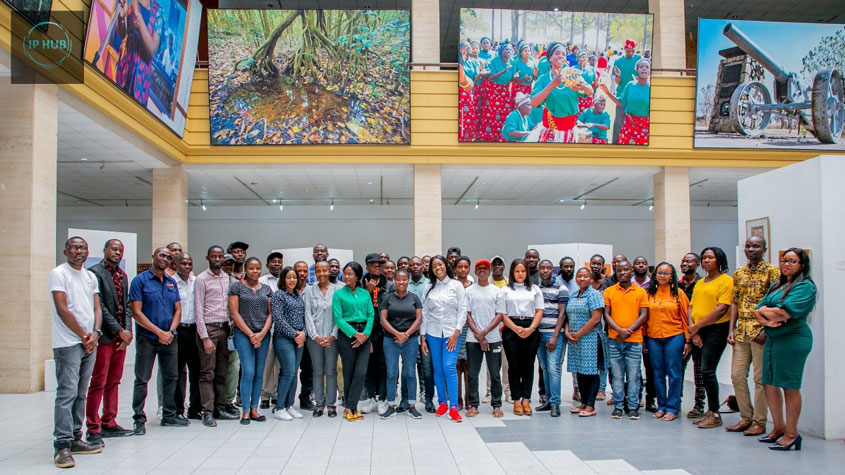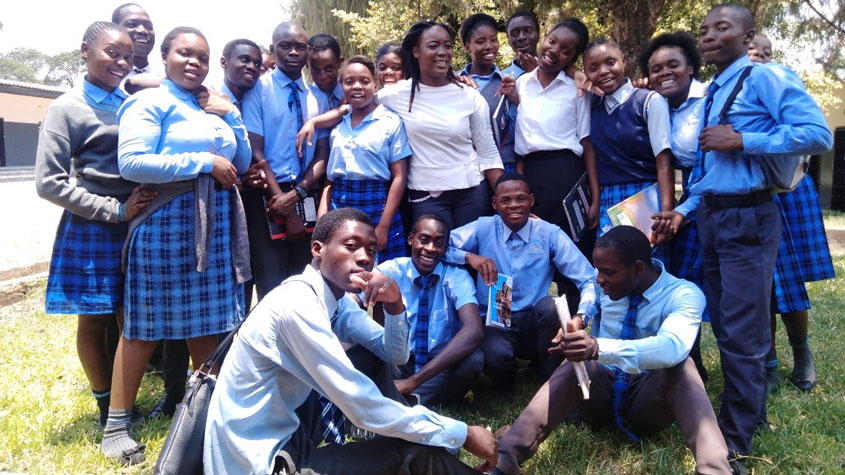
Intellectual Property Hub Zambia: How it All Began
By Diana Mazonga, freelance writer, Lusaka, Zambia
Through Intellectual Property (IP) Hub Zambia, Precious Gozwa is raising IP awareness in Zambia and educating people about the importance of rights they didn’t know they had. Through her consultancy services, 26-year-old Gozwa has broken the norm by tackling the fascinating topic of intellectual property (IP) in her community.
Gozwa is the founder of Intellectual Property Hub Zambia. The hub’s mission is to instill the value and importance of IP rights while fostering an environment that promotes innovation and creativity for the benefit of the creator, communities and Zambia’s economic development.

IP Hub Zambia was born in 2017. Its evolution is the result of Gozwa’s passion and drive to “put Zambia on the IP map.” Gozwa was a fourth-year undergraduate student at Copperbelt University at the time. Intrigued by innovation and creativity, Gozwa opted to take an elective course in IP. That year, WIPO had published on its website a map of countries that were participating in its annual World Intellectual Property Day campaign. The campaign seeks to raise awareness about the role that IP plays in supporting social, economic and cultural development at local, regional and national levels.
“I took a close look at that map and it bothered me that Zambia was not among the many countries around the world that were celebrating World Intellectual Property Day,” Gozwa says. “We have many innovative and creative people in this country, and yet they weren’t being celebrated.”
That moment marked the start of an exciting endeavor to ensure that Zambia features in this important global IP public awareness campaign. Gozwa wrote to WIPO, drew on the great campaign resources they make available every year, and started her own World IP Day campaign, organizing her first World IP Day event in the American Corner at her University.
Raising IP awareness in Zambia and beyond
“I am so passionate about my country and its potential. Zambia, is so full of resources, beauty, talent, creativity, and wealth. My goal with the IP Hub is to showcase the greatness of Zambia to the world and to support its future development.”
In less than a week before World IP Day 2017 ̶ April 26 is the date on which World IP Day is celebrated every year ̶ Gozwa put together a social media campaign around the theme of that year’s campaign: Innovation: Improving Lives. She persuaded her classmates to start raising IP awareness too. She also organized a seminar, bringing together over 70 students to hear directly from officials from the Zambian Patents and Companies Registration Agency (PACRA) about how IP rights can support business growth and community development. Various inventors also shared their insights and experience of IP.

of Gozwa’s IP awareness journey. She put
together a social media campaign to celebrate
World IP Day and also persuaded her classmates
to start raising IP awareness too.
(Photo: Courtesy of IP Hub Zambia)
“I was not sure if people would turn up for the event. Thankfully, I had the support of my lecturer, Dr. Mwiya, who has always been there to help bring my ideas to life,” Gozwa says. She need not have worried as the event created a real buzz around IP and was a great success.
A few years down the line, Gozwa made it her goal to bring relevant national organizations on side in celebrating World IP Day. To this end, she engaged with organizations like the National Technology Business Centre (NTBC) and PACRA to engage their support in facilitating IP awareness events across her community. Through her engagement in national World IP Day events, Gozwa has reached out to the broader public across Zambia through radio, social media, speaking engagements, and IP seminars.
Gozwa is one of the few women in Zambia to offer free IP consultancy services […] helping SMEs and other companies to recognize and protect their IP assets.
Currently, Gozwa is one of the few women in Zambia to offer free IP consultancy services to members of the public in Zambia, helping SMEs and other companies to recognize and protect their IP assets. She is also a member of the Board of The Global Intellectual Property Alliance (GLIPA) and co–leads GLIPA’s IP outreach efforts for the African Region. GLIPA is a non-profit organization whose vision is to build a world in which IP empowers all people to improve their lives and create a more prosperous, sustainable and inclusive future through IP awareness, education, and collaboration.
Tapping the potential of Zambian women and their IP assets
According the World Bank, the population of Zambia is made up of 9.86 million women and 9.60 million men. However, a brief look at official records suggests that women’s participation in innovation remains very low and that women are not active in their use of the IP system. This is a real eye-opener. It points to the huge untapped potential of women in Zambia. So what can we do to encourage more women and girls to pursue careers in science, technology, engineering and mathematics (STEM) and the arts to help build a thriving economy and a sustainable future for Zambia?
There is a clear need for collaboration between multiple stakeholders to enhance and create an open, enabling environment for women to realize their ambitions and thereby contribute to the nation’s economic performance. Key institutions need to come together to develop policies and legal frameworks that embrace the principles of diversity and inclusion and that actively encourage women to create, protect and manage their IP assets for business growth.

As a Zambian woman, my role, among others, is to invite women across Zambia to find out how IP rights can help them transform their inventive and creative ideas into profitable businesses.
Precious Gozwa
“As a Zambian woman, my role, among others, is to invite women across Zambia to find out how IP rights can help them transform their inventive and creative ideas into profitable businesses. I see our country slowly stepping towards a more inclusive IP landscape with a growing number of women breaking from their shells, driving change and contributing to Zambia’s socioeconomic development,” Gozwa says. “While the growing number of women-led businesses are a promising sign that we are moving in the right direction, there is still a lot more to be done to ensure that more women are able to take advantage of the benefits that can flow from effective use of IP rights.”
In a country where the median age is 17.6, Gozwa’s main focus is around engaging more young women to switch on to and leverage IP. It is this young generation who will drive the development of Zambia’s knowledge-based economy, and women have a key contribution to make in realizing Zambia’s 2030 vision to become a prosperous middle-income country.
Women have a key contribution to make in realizing Zambia’s 2030 vision to become a prosperous middle-income country.
Precious Gozwa
Ambitious, young biomedical engineer
Retiana Phiri, a software developer, inventor and third-year biomedical engineering student, is one of a number of outstanding women that Gozwa is currently working with. Phiri has won many accolades, including the youngest inventor 2021 award (which came with a prize of USD 5,000) from the National Innovation Initiative and United Nations Development Programme. In 2019, Phiri invented a period comforter (PEC), a therapeutic device that helps relieve pain associated with menstruation, osteoarthritis fibroids and urinary and reproductive tract infections.
With no funds to engage a patent lawyer, Phiri taught herself how to patent and protect her invention through videos and online materials. In 2021, Phiri was granted a provisional patent, which is under review and awaiting approval from PACRA. Gozwa and Phiri have now teamed up to secure patents for two other inventions developed by Phiri.
“Filing my first patent application in Zambia was not easy. It was difficult to get hold of the information I needed to file my application successfully. I am really glad to now have the support of IP Hub to help me in this process. I want to see many more women working in the innovation space,” Phiri says.
Gozwa and Phiri are also working together to raise awareness about the opportunities that IP can offer young people in engineering. For example, they are collaborating with the Women in Engineering Institution run by Evelyn Hone, to encourage more women in engineering to develop innovative and marketable solutions.
“We need to harness the talents of women and enable them to drive change through innovation. I am going to do all I can to help and inspire as many women as possible to realize their ambitions and put their talent for innovation and creativity to work,” Phiri says.
Women have a significant role to play in achieving the Sustainable Development Goals to end poverty, protect the planet, and ensure all people enjoy peace and prosperity.
Precious Gozwa
Hope for the future
“The 2023 World Intellectual Property Day theme, Women and IP: Accelerating Innovation and Creativity, could not have come at a better time. My vision is to see more capable, confident women bringing their intellectual property assets to light and leveraging value from them. This is a key time for every woman to showcase her unique ideas, perspectives and talents, whether she is working in STEM or the creative industries. Women have a significant role to play in achieving the Sustainable Development Goals to end poverty, protect the planet, and ensure all people enjoy peace and prosperity,” Gozwa says.

Going forward, Gozwa’s sights are set on building collaborations with key government institutions to ensure the integration of IP into the high-school education system. This will introduce young people to IP rights ̶ and the potential opportunities to be derived from their effective management ̶ from an early age. Her ambition is to work with key stakeholders to bridge existing gaps in IP information and knowledge, and in so doing, to support the development of a robust eco-friendly IP system that promotes innovation and creativity and inspires the entrepreneurial spirit of young people in Zambia and beyond.
The WIPO Magazine is intended to help broaden public understanding of intellectual property and of WIPO’s work, and is not an official document of WIPO. The designations employed and the presentation of material throughout this publication do not imply the expression of any opinion whatsoever on the part of WIPO concerning the legal status of any country, territory or area or of its authorities, or concerning the delimitation of its frontiers or boundaries. This publication is not intended to reflect the views of the Member States or the WIPO Secretariat. The mention of specific companies or products of manufacturers does not imply that they are endorsed or recommended by WIPO in preference to others of a similar nature that are not mentioned.